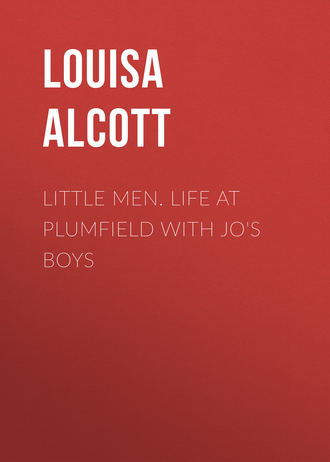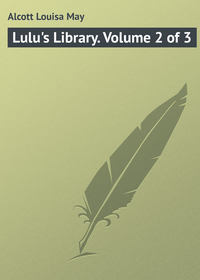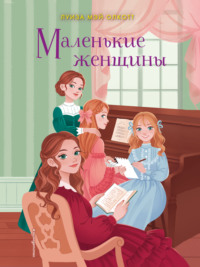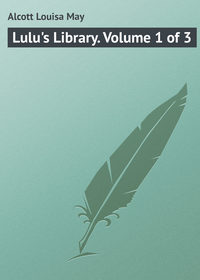 полная версия
полная версияLittle Men. Life at Plumfield with Jo's Boys
When the boys came bursting out of school, they found the children tugging at their halters like a pair of restive little colts, and were much edified, as well as amused, by the sequel to the exciting adventures of the night.
“Untie me now, Marmar; my conscience will prick like a pin next time, I know it will,” said Rob, as the bell rang, and Teddy came to look at him with sorrowful surprise.
“We shall see,” answered his mother, setting him free. He took a good run down the hall, back through the dining-room, and brought up beside Nan, quite beaming with virtuous satisfaction.
“I’ll bring her dinner to her, may I?” he asked, pitying his fellow-captive.
“That’s my kind little son! Yes, pull out the table, and get a chair;” and Mrs. Jo hurried away to quell the ardor of the others, who were always in a raging state of hunger at noon.
Nan ate alone, and spent a long afternoon attached to the sofa. Mrs. Bhaer lengthened her bonds so that she could look out of the window; and there she stood watching the boys play, and all the little summer creatures enjoying their liberty. Daisy had a picnic for the dolls on the lawn, so that Nan might see the fun if she could not join in it. Tommy turned his best somersaults to console her; Demi sat on the steps reading aloud to himself, which amused Nan a good deal; and Dan brought a little tree-toad to show her as the most delicate attention in his power.
But nothing atoned for the loss of freedom; and a few hours of confinement taught Nan how precious it was. A good many thoughts went through the little head that lay on the window-sill during the last quiet hour when all the children went to the brook to see Emil’s new ship launched. She was to have christened it, and had depended on smashing a tiny bottle of currant-wine over the prow as it was named Josephine in honor of Mrs. Bhaer. Now she had lost her chance, and Daisy wouldn’t do it half so well. Tears rose to her eyes as she remembered that it was all her own fault; and she said aloud, addressing a fat bee who was rolling about in the yellow heart of a rose just under the window, —
“If you have run away, you’d better go right home, and tell your mother you are sorry, and never do so any more.”
“I am glad to hear you give him such good advice, and I think he has taken it,” said Mrs. Jo, smiling, as the bee spread his dusty wings and flew away.
Nan brushed off a bright drop or two that shone on the window-sill, and nestled against her friend as she took her on her knee, adding kindly – for she had seen the little drops, and knew what they meant —
“Do you think my mother’s cure for running away a good one?”
“Yes, ma’am,” answered Nan, quite subdued by her quiet day.
“I hope I shall not have to try it again.”
“I guess not;” and Nan looked up with such an earnest little face that Mrs. Jo felt satisfied, and said no more, for she liked to have her penalties do their own work, and did not spoil the effect by too much moralizing.
Here Rob appeared, bearing with infinite care what Asia called a “sarcer pie,” meaning one baked in a saucer.
“It’s made out of some of my berries, and I’m going to give you half at supper-time,” he announced with a flourish.
“What makes you, when I’m so naughty?” asked Nan, meekly.
“Because we got lost together. You ain’t going to be naughty again, are you?”
“Never,” said Nan, with great decision.
“Oh, goody! now let’s go and get Mary Ann to cut this for us all ready to eat; it’s ’most tea-time;” and Rob beckoned with the delicious little pie.
Nan started to follow, then stopped, and said, —
“I forgot, I can’t go.”
“Try and see,” said Mrs. Bhaer, who had quietly untied the cord sash while she had been talking.
Nan saw that she was free, and with one tempestuous kiss to Mrs. Jo, she was off like a humming-bird, followed by Robby, dribbling huckleberry juice as he ran.
CHAPTER XIII
GOLDILOCKS
After the last excitement peace descended upon Plumfield and reigned unbroken for several weeks, for the elder boys felt that the loss of Nan and Rob lay at their door, and all became so paternal in their care that they were rather wearying; while the little ones listened to Nan’s recital of her perils so many times, that they regarded being lost as the greatest ill humanity was heir to, and hardly dared to put their little noses outside the great gate lest night should suddenly descend upon them, and ghostly black cows come looming through the dusk.
“It’s too good to last,” said Mrs. Jo; for years of boy-culture had taught her that such lulls were usually followed by outbreaks of some sort, and when less wise women would have thought that the boys had become confirmed saints, she prepared herself for a sudden eruption of the domestic volcano.
One cause of this welcome calm was a visit from little Bess, whose parents lent her for a week while they were away with Grandpa Laurence, who was poorly. The boys regarded Goldilocks as a mixture of child, angel, and fairy, for she was a lovely little creature, and the golden hair which she inherited from her blonde mamma enveloped her like a shining veil, behind which she smiled upon her worshippers when gracious, and hid herself when offended. Her father would not have it cut and it hung below her waist, so soft and fine and bright, that Demi insisted that it was silk spun from a cocoon. Every one praised the little Princess, but it did not seem to do her harm, only to teach her that her presence brought sunshine, her smiles made answering smiles on other faces, and her baby griefs filled every heart with tenderest sympathy.
Unconsciously she did her young subjects more good than many a real sovereign, for her rule was very gentle and her power was felt rather than seen. Her natural refinement made her dainty in all things, and had a good effect upon the careless lads about her. She would let no one touch her roughly or with unclean hands, and more soap was used during her visits than at any other time, because the boys considered it the highest honor to be allowed to carry her highness, and the deepest disgrace to be repulsed with the disdainful command, “Do away, dirty boy!”
Loud voices displeased her and quarrelling frightened her; so gentler tones came into the boyish voices as they addressed her, and squabbles were promptly suppressed in her presence by lookers-on if the principals could not restrain themselves. She liked to be waited on, and the biggest boys did her little errands without a murmur, while the small lads were her devoted slaves in all things. They begged to be allowed to draw her carriage, bear her berry-basket, or pass her plate at table. No service was too humble, and Tommy and Ned came to blows before they could decide which should have the honor of blacking her little boots.
Nan was especially benefited by a week in the society of a well-bred lady, though such a very small one; for Bess would look at her with a mixture of wonder and alarm in her great blue eyes when the hoyden screamed and romped; and she shrunk from her as if she thought her a sort of wild animal. Warm-hearted Nan felt this very much. She said at first, “Pooh! I don’t care!” But she did care, and was so hurt when Bess said, “I love my tuzzin best, tause she is twiet,” that she shook poor Daisy till her teeth chattered in her head, and then fled to the barn to cry dismally. In that general refuge for perturbed spirits she found comfort and good counsel from some source or other. Perhaps the swallows from their mud-built nests overhead twittered her a little lecture on the beauty of gentleness. However that might have been, she came out quite subdued, and carefully searched the orchard for a certain kind of early apple that Bess liked because it was sweet and small and rosy. Armed with this peace-offering, she approached the Princess, and humbly presented it. To her great joy it was graciously accepted, and when Daisy gave Nan a forgiving kiss, Bess did likewise, as if she felt that she had been too severe, and desired to apologize. After this they played pleasantly together, and Nan enjoyed the royal favor for days. To be sure she felt a little like a wild bird in a pretty cage at first, and occasionally had to slip out to stretch her wings in a long flight, or to sing at the top of her voice, where neither would disturb the plump turtle-dove Daisy, nor the dainty golden canary Bess. But it did her good; for, seeing how every one loved the little Princess for her small graces and virtues, she began to imitate her, because Nan wanted much love, and tried hard to win it.
Not a boy in the house but felt the pretty child’s influence, and was improved by it without exactly knowing how or why, for babies can work miracles in the hearts that love them. Poor Billy found infinite satisfaction in staring at her, and though she did not like it she permitted it without a frown, after she had been made to understand that he was not quite like the others, and on that account must be more kindly treated. Dick and Dolly overwhelmed her with willow whistles, the only thing they knew how to make, and she accepted but never used them. Rob served her like a little lover, and Teddy followed her like a pet dog. Jack she did not like, because he was afflicted with warts and had a harsh voice. Stuffy displeased her because he did not eat tidily, and George tried hard not to gobble, that he might not disgust the dainty little lady opposite. Ned was banished from court in utter disgrace when he was discovered tormenting some unhappy field-mice. Goldilocks never could forget the sad spectacle, and retired behind her veil when he approached, waving him away with an imperious little hand, and crying, in a tone of mingled grief and anger, —
“No, I tarn’t love him; he tut the poor mouses’ little tails off, and they queeked!”
Daisy promptly abdicated when Bess came, and took the humble post of chief cook, while Nan was first maid of honor; Emil was chancellor of the exchequer, and spent the public moneys lavishly in getting up spectacles that cost whole ninepences. Franz was prime minister, and directed her affairs of state, planned royal progresses through the kingdom, and kept foreign powers in order. Demi was her philosopher, and fared much better than such gentlemen usually do among crowned heads. Dan was her standing army, and defended her territories gallantly; Tommy was court fool, and Nat a tuneful Rizzio to this innocent little Mary.
Uncle Fritz and Aunt Jo enjoyed this peaceful episode, and looked on at the pretty play in which the young folk unconsciously imitated their elders, without adding the tragedy that is so apt to spoil the dramas acted on the larger stage.
“They teach us quite as much as we teach them,” said Mr. Bhaer.
“Bless the dears! they never guess how many hints they give us as to the best way of managing them,” answered Mrs. Jo.
“I think you were right about the good effect of having girls among the boys. Nan has stirred up Daisy, and Bess is teaching the little bears how to behave better than we can. If this reformation goes on as it has begun, I shall soon feel like Dr. Blimber with his model young gentlemen,” said Professor, laughing, as he saw Tommy not only remove his own hat, but knock off Ned’s also, as they entered the hall where the Princess was taking a ride on the rocking-horse, attended by Rob and Teddy astride of chairs, and playing gallant knights to the best of their ability.
“You will never be a Blimber, Fritz, you couldn’t do it if you tried; and our boys will never submit to the forcing process of that famous hot-bed. No fear that they will be too elegant: American boys like liberty too well. But good manners they cannot fail to have, if we give them the kindly spirit that shines through the simplest demeanor, making it courteous and cordial, like yours, my dear old boy.”
“Tut! tut! we will not compliment; for if I begin you will run away, and I have a wish to enjoy this happy half hour to the end;” yet Mr. Bhaer looked pleased with the compliment, for it was true, and Mrs. Jo felt that she had received the best her husband could give her, by saying that he found his truest rest and happiness in her society.
“To return to the children: I have just had another proof of Goldilocks’ good influence,” said Mrs. Jo, drawing her chair nearer the sofa, where the Professor lay resting after a long day’s work in his various gardens. “Nan hates sewing, but for love of Bess has been toiling half the afternoon over a remarkable bag in which to present a dozen of our love-apples to her idol when she goes. I praised her for it, and she said, in her quick way, ‘I like to sew for other people; it is stupid sewing for myself.’ I took the hint, and shall give her some little shirts and aprons for Mrs. Carney’s children. She is so generous, she will sew her fingers sore for them, and I shall not have to make a task of it.”
“But needlework is not a fashionable accomplishment, my dear.”
“Sorry for it. My girls shall learn all I can teach them about it, even if they give up the Latin, Algebra, and half-a-dozen ologies it is considered necessary for girls to muddle their poor brains over now-a-days. Amy means to make Bess an accomplished woman; but the dear’s mite of a forefinger has little pricks on it already, and her mother has several specimens of needlework which she values more than the clay bird without a bill, that filled Laurie with such pride when Bess made it.”
“I also have a proof of the Princess’s power,” said Mr. Bhaer, after he had watched Mrs. Jo sew on a button with an air of scorn for the whole system of fashionable education. “Jack is so unwilling to be classed with Stuffy and Ned, as distasteful to Bess, that he came to me a little while ago, and asked me to touch his warts with caustic. I have often proposed it, and he never would consent; but now he bore the smart manfully, and consoles his present discomfort by hopes of future favor, when he can show her fastidious ladyship a smooth hand.”
Mrs. Bhaer laughed at the story, and just then Stuffy came in to ask if he might give Goldilocks some of the bonbons his mother had sent him.
“She is not allowed to eat sweeties; but if you like to give her the pretty box with the pink sugar-rose in it, she would like it very much,” said Mrs. Jo, unwilling to spoil this unusual piece of self-denial, for the “fat boy” seldom offered to share his sugar-plums.
“Won’t she eat it? I shouldn’t like to make her sick,” said Stuffy, eying the delicate sweetmeat lovingly, yet putting it into the box.
“Oh, no, she won’t touch it, if I tell her it is to look at, not to eat. She will keep it for weeks, and never think of tasting it. Can you do as much?”
“I should hope so! I’m ever so much older than she is,” cried Stuffy, indignantly.
“Well, suppose we try. Here, put your bonbons in this bag, and see how long you can keep them. Let me count – two hearts, four red fishes, three barley-sugar horses, nine almonds, and a dozen chocolate drops. Do you agree to that?” asked sly Mrs. Jo, popping the sweeties into her little spool-bag.
“Yes,” said Stuffy, with a sigh; and pocketing the forbidden fruit, he went away to give Bess the present, that won a smile from her, and permission to escort her round the garden.
“Poor Stuffy’s heart has really got the better of his stomach at last, and his efforts will be much encouraged by the rewards Bess gives him,” said Mrs. Jo.
“Happy the man who can put temptation in his pocket and learn self-denial from so sweet a little teacher!” added Mr. Bhaer, as the children passed the window, Stuffy’s fat face full of placid satisfaction, and Goldilocks surveying her sugar-rose with polite interest, though she would have preferred a real flower with a “pitty smell.”
When her father came to take her home, a universal wail arose, and the parting gifts showered upon her increased her luggage to such an extent that Mr. Laurie proposed having out the big wagon to take it into town. Every one had given her something; and it was found difficult to pack white mice, cake, a parcel of shells, apples, a rabbit kicking violently in a bag, a large cabbage for his refreshment, a bottle of minnows, and a mammoth bouquet. The farewell scene was moving, for the Princess sat upon the hall-table, surrounded by her subjects. She kissed her cousins, and held out her hand to the other boys, who shook it gently with various soft speeches, for they were taught not to be ashamed of showing their emotions.
“Come again soon, little dear,” whispered Dan, fastening his best green-and-gold beetle in her hat.
“Don’t forget me, Princess, whatever you do,” said the engaging Tommy, taking a last stroke of the pretty hair.
“I am coming to your house next week, and then I shall see you, Bess,” added Nat, as if he found consolation in the thought.
“Do shake hands now,” cried Jack, offering a smooth paw.
“Here are two nice new ones to remember us by,” said Dick and Dolly, presenting fresh whistles, quite unconscious that seven old ones had been privately deposited in the kitchen-stove.
“My little precious! I shall work you a bookmark right away, and you must keep it always,” said Nan, with a warm embrace.
But of all the farewells, poor Billy’s was the most pathetic, for the thought that she was really going became so unbearable that he cast himself down before her, hugging her little blue boots and blubbering despairingly, “Don’t go away! oh, don’t!” Goldilocks was so touched by this burst of feeling, that she leaned over and lifting the poor lad’s head, said, in her soft, little voice, —
“Don’t cry, poor Billy! I will tiss you and tum adain soon.”
This promise consoled Billy, and he fell back beaming with pride at the unusual honor conferred upon him.
“Me too! me too!” clamored Dick and Dolly, feeling that their devotion deserved some return. The others looked as if they would like to join in the cry; and something in the kind, merry faces about her moved the Princess to stretch out her arms and say, with reckless condescension, —
“I will tiss evvybody!”
Like a swarm of bees about a very sweet flower, the affectionate lads surrounded their pretty playmate, and kissed her till she looked like a little rose, not roughly, but so enthusiastically that nothing but the crown of her hat was visible for a moment. Then her father rescued her, and she drove away still smiling and waving her hands, while the boys sat on the fence screaming like a flock of guinea-fowls, “Come back! come back!” till she was out of sight.
They all missed her, and each dimly felt that he was better for having known a creature so lovely, delicate, and sweet; for little Bess appealed to the chivalrous instinct in them as something to love, admire, and protect with a tender sort of reverence. Many a man remembers some pretty child who has made a place in his heart and kept her memory alive by the simple magic of her innocence; these little men were just learning to feel this power, and to love it for its gentle influence, not ashamed to let the small hand lead them, nor to own their loyalty to womankind, even in the bud.
CHAPTER XIV
DAMON AND PYTHIAS
Mrs. Bhaer was right; peace was only a temporary lull, a storm was brewing, and two days after Bess left, a moral earthquake shook Plumfield to its centre.
Tommy’s hens were at the bottom of the trouble, for if they had not persisted in laying so many eggs, he could not have sold them and made such sums. Money is the root of all evil, and yet it is such a useful root that we cannot get on without it any more than we can without potatoes. Tommy certainly could not, for he spent his income so recklessly, that Mr. Bhaer was obliged to insist on a savings-bank, and presented him with a private one – an imposing tin edifice, with the name over the door, and a tall chimney, down which the pennies were to go, there to rattle temptingly till leave was given to open a sort of trap-door in the floor.
The house increased in weight so rapidly, that Tommy soon became satisfied with his investment, and planned to buy unheard-of treasures with his capital. He kept account of the sums deposited, and was promised that he might break the bank as soon as he had five dollars, on condition that he spent the money wisely. Only one dollar was needed, and the day Mrs. Jo paid him for four dozen eggs, he was so delighted, that he raced off to the barn to display the bright quarters to Nat, who was also laying by money for the long-desired violin.
“I wish I had ’em to put with my three dollars, then I’d soon get enough to buy my fiddle,” he said, looking wistfully at the money.
“P’raps I’ll lend you some. I haven’t decided yet what I’ll do with mine,” said Tommy, tossing up his quarters, and catching them as they fell.
“Hi! boys! come down to the brook and see what a jolly great snake Dan’s got!” called a voice from behind the barn.
“Come on,” said Tommy; and, laying his money inside the old winnowing machine, away he ran, followed by Nat.
The snake was very interesting, and then a long chase after a lame crow, and its capture, so absorbed Tommy’s mind and time, that he never thought of his money till he was safely in bed that night.
“Never mind, no one but Nat knows where it is,” said the easy-going lad, and fell asleep untroubled by any anxiety about his property.
Next morning, just as the boys assembled for school, Tommy rushed into the room breathlessly, demanding, —
“I say, who has got my dollar?”
“What are you talking about?” asked Franz.
Tommy explained, and Nat corroborated his statement.
Every one else declared they knew nothing about it, and began to look suspiciously at Nat, who got more and more alarmed and confused with each denial.
“Somebody must have taken it,” said Franz, as Tommy shook his fist at the whole party, and wrathfully declared that —
“By thunder turtles! if I get hold of the thief, I’ll give him what he won’t forget in a hurry.”
“Keep cool, Tom; we shall find him out; thieves always come to grief,” said Dan, as one who knew something of the matter.
“May be some tramp slept in the barn and took it,” suggested Ned.
“No, Silas don’t allow that; besides, a tramp wouldn’t go looking in that old machine for money,” said Emil, with scorn.
“Wasn’t it Silas himself?” said Jack.
“Well, I like that! Old Si is as honest as daylight. You wouldn’t catch him touching a penny of ours,” said Tommy, handsomely defending his chief admirer from suspicion.
“Whoever it was had better tell, and not wait to be found out,” said Demi, looking as if an awful misfortune had befallen the family.
“I know you think it’s me,” broke out Nat, red and excited.
“You are the only one who knew where it was,” said Franz.
“I can’t help it – I didn’t take it. I tell you I didn’t – I didn’t!” cried Nat, in a desperate sort of way.
“Gently, gently, my son! What is all this noise about?” and Mr. Bhaer walked in among them.
Tommy repeated the story of his loss, and, as he listened, Mr. Bhaer’s face grew graver and graver; for, with all their faults and follies, the lads till now had been honest.
“Take your seats,” he said; and, when all were in their places, he added slowly, as his eye went from face to face with a grieved look, that was harder to bear than a storm of words, —
“Now, boys, I shall ask each one of you a single question, and I want an honest answer. I am not going to try to frighten, bribe, or surprise the truth out of you, for every one of you have got a conscience, and know what it is for. Now is the time to undo the wrong done to Tommy, and to set yourselves right before us all. I can forgive the yielding to a sudden temptation much easier than I can deceit. Don’t add a lie to the theft, but confess frankly, and we will all try to help you make us forget and forgive.”
He paused a moment, and one might have heard a pin drop, the room was so still; then slowly and impressively he put the question to each one, receiving the same answer in varying tones from all. Every face was flushed and excited, so that Mr. Bhaer could not take color as a witness, and some of the little boys were so frightened that they stammered over the two short words as if guilty, though it was evident that they could not be. When he came to Nat, his voice softened, for the poor lad looked so wretched, Mr. Bhaer felt for him. He believed him to be the culprit, and hoped to save the boy from another lie, by winning him to tell the truth without fear.









